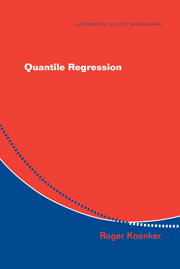Book contents
- Frontmatter
- Contents
- Preface
- 1 Introduction
- 2 Fundamentals of Quantile Regression
- 3 Inference for Quantile Regression
- 4 Asymptotic Theory of Quantile Regression
- 5 L-Statistics and Weighted Quantile Regression
- 6 Computational Aspects of Quantile Regression
- 7 Nonparametric Quantile Regression
- 8 Twilight Zone of Quantile Regression
- 9 Conclusion
- A Quantile Regression in R: A Vignette
- B Asymptotic Critical Values
- References
- Name Index
- Subject Index
A - Quantile Regression in R: A Vignette
Published online by Cambridge University Press: 06 July 2010
- Frontmatter
- Contents
- Preface
- 1 Introduction
- 2 Fundamentals of Quantile Regression
- 3 Inference for Quantile Regression
- 4 Asymptotic Theory of Quantile Regression
- 5 L-Statistics and Weighted Quantile Regression
- 6 Computational Aspects of Quantile Regression
- 7 Nonparametric Quantile Regression
- 8 Twilight Zone of Quantile Regression
- 9 Conclusion
- A Quantile Regression in R: A Vignette
- B Asymptotic Critical Values
- References
- Name Index
- Subject Index
Summary
INTRODUCTION
Beran's (2003) provocative definition of statistics as “the study of algorithms for data analysis” elevates computational considerations to the forefront of the field. It is apparent that the evolutionary success of statistical methods is to a significant degree determined by considerations of computational convenience. As a result, design and dissemination of statistical software has become an integral part of statistical research. Algorithms are no longer the exclusive purview of the numerical analyst or the proto-industrial software firm; they are an essential part of the artisanal research process. Fortunately, modern computing has also transformed the software development process and greatly facilitated collaborative research; the massive collective international effort represented by the R project exceeds the most idealistic Marxist imagination.
Algorithms have been a crucial part of the research challenge of quantile regression methods since their inception in the 18th century. Stigler (1984) describes an amusing episode in 1760 in which the itinerant Croatian Jesuit Rudjer Boscovich sought computational advice in London regarding his nascent method for median regression. Ironically, a fully satisfactory answer to Boscovich's questions only emerged with the dawn of modern computing. The discovery of the simplex method and subsequent developments in linear programming have made quantile regression methods competitive with traditional least-squares methods in terms of their computational effort. These computational developments have also played a critical role in encouraging a deeper appreciation of the statistical advantages of these methods.
- Type
- Chapter
- Information
- Quantile Regression , pp. 295 - 316Publisher: Cambridge University PressPrint publication year: 2005
- 8
- Cited by

